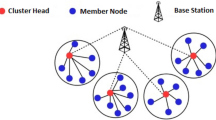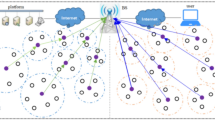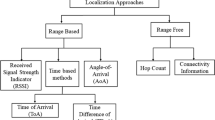Abstract
We consider the random field estimation problem with parametric trend in wireless sensor networks where the field can be described by unknown parameters to be estimated. Due to the limited resources, the network selects only a subset of the sensors to perform the estimation task with a desired performance under the D-optimal criterion. We propose a greedy sampling scheme to select the sensor nodes according to the information gain of the sensors. A distributed algorithm is also developed by consensus-based incremental sensor node selection through information quality computation for and message exchange among neighboring sensors. Simulation results show the good performance of the proposed algorithms.
Similar content being viewed by others
References
I. F. Akyildiz, W. Su, Y. Sankarasubramaniam, et al. Wireless sensor networks: A survey[J]. Computer Networks, 2002, 38(4): 393–422.
J. E. Besag. Spatial interaction and the statistical analysis of lattice systems[J]. Journal of the Royal Statistical Society: Series B, 1974, 32(2): 192–236.
M. C. Vuran, B. Akan, I. F. Akyildiz. Spatio-temporal correlation: Theory and applications for wireless sensor networks[J]. Computer Networks, 2004, 45(3): 245–259.
A. Dogandzic, K. Qiu. Decentralized random-field estimation for sensor networks using quantized spatially correlated data and fusioncenter feedback[J]. IEEE Transactions on Signal Processing, 2008, 56(12): 6069–6085.
J. F. Chamberland, V. V. Veeravalli. Decentralized detection in sensor networks[J]. IEEE Transactions on Signal Processing, 2003, 51(2): 407–416.
A. D’Costa, V. Ramachandran, A. M. Sayeed. Distributed classification of Gaussian space-time sources in wireless sensor networks[J]. IEEE Journal on Selected Areas in Communications, 2004, 22(6): 1026–1036.
J. Lin, W. Xiao, F. Lewis, et al. Energy efficient distributed adaptive multi-sensor scheduling for target tracking in wireless sensor networks[J]. IEEE Transactions on Instrumentation and Measurement, 2009, 58(6): 1886–1896.
W. Xiao, S. Zhang, J. Lin, et al. Energy-efficient adaptive sensor scheduling for target tracking in wireless sensor networks[J]. Journal of Control Theory and Application, 2009, 8(1): 86–92.
F. Bian, D. Kempe, R. Govindan. Utility based sensor selection[C]// The 5th International Conference on Information Processing in Sensor Networks. New York: Association for Computing Machinery, 2006: 11–18.
A. Krause, A. Singh, C. Guestrin. Near-optimal sensor placements in Gaussian processes: Theory, efficient algorithms and empirical Studies[J]. The Journal of Machine Learning Research, 2008, 9: 235–284.
S. Joshi, S. Boyd. Sensor selection via convex optimization[J]. IEEE Transactions on Signal Processing, 2009, 57(2): 451–462.
R. Nowak, U. Mitra, R. Willett. Estimating inhomogeneous fields using wireless sensor networks[J]. IEEE Journal on Selected Areas in Communications, 2004, 22(6): 999–1006.
V. Saligrama, M. Alanyali, O. Savas. Distributed detection in sensor networks with packet losses and finite capacity links[J]. IEEE Transactions on Signal Processing, 2006, 54(2): 4118–4132.
R. Olfati-Saber, R. M. Murray. Consensus problems in networks of agents with switching topology and time-delays[J]. IEEE Transactions on Automatic Control, 2004, 49(9): 1520–1533.
Z. Quan, W. Kaiser, A. H. Sayed. Innovations diffusion: A spatial sampling scheme for distributed estimation and detection[J]. IEEE Transactions on Signal Processing, 2009, 57(2): 738–751.
N. A. Cressie. Statistics for Spatial Data[M]. Revised ed. New York: John Wiley & Sons, 1993.
F. Pukelsheim. Optimal Design of Experiments[M]. Philadelphia: Society for Industrial & Applied Mathematics (SIAM), 2006.
A. Wald. On the efficient design of statistical investigatinos[J]. The Annals of Mathematical Statistics, 1943, 14: 134–140.
J. Kiefer, J. Wolfowitz. Optimum designs in regression problems[J]. The Annals of Mathematical Statistics, 1959, 30: 271–294.
N. K. Nguyen, A. J. Miller. A review of some exchange algorithms for constructing discrete D-optimal designs[J]. Computational Statistics & Data Analysisl, 1992, 14(4): 489–498.
Y. Weng, L. Xie, W. Xiao. Random field estimation with quantized measurements in sensor networks[C]//Proceedings of the 29th Chinese Control Conference. Beijing, 2010: 6203–6208.
A. H. Sayed. Fundamentals of Adaptive Filtering[M]. New York: John Wiley & Sons, 2003.
C. W. Ko, J. Lee. An exact algorithm for maximum entropy sampling[J]. Operations Research, 1995, 43(4): 684–691.
N. A. Ahmed, D. V. Gokhale. Entropy expressions and their estimators for multivariate distributions[J]. IEEE Transactions on Information Theory, 1989, 35(3): 688–692.
Author information
Authors and Affiliations
Corresponding author
Additional information
This work was partly supported by the National Natural Science Foundation of China-Key Program (No. 61032001) and the National Natural Science Foundation of China (No. 60828006).
Yang WENG received his B.S. and Ph.D. degrees from the Mathematics Department, Sichuan University, Chengdu, China, in 2001 and 2006, respectively. He has been a lecturer at the School of Mathematics, Sichuan University, Chengdu, China, since 2006. He was a research fellow at the Nanyang Technological University, Singapore, from August 2008 to July 2010. His current research interests include statistic signal processing, signal detection, and estimation.
Wendong XIAO received his B.S. degree in Mathematics and Ph.D. degree in Automatic Control from the Northeastern University, China, in 1990 and 1995, respectively. Currently, he is a research scientist at the Institute for Infocomm Research, Agency for Science, Technology and Research (A*Star), Singapore. Previously, he held research and academic positions at the POSCO Technical Research Laboratories (South Korea), Northeastern University (China), and Nanyang Technological University (Singapore). His current research interests include collaborative signal processing, localization and tracking, communication protocols, and information-driven resource management in wireless ad hoc, sensor, and mesh networks. He is a senior member of IEEE and a member of ACM.
Lihua XIE received his B.E. and M.E. degrees in Electrical Engineering from Nanjing University of Science and Technology in 1983 and 1986, respectively, and Ph.D. degree in Electrical Engineering from the University of Newcastle, Australia, in 1992. Since 1992, he has been with the School of Electrical and Electronic Engineering, Nanyang Technological University, Singapore, where he is currently a professor and the Director, Centre for Intelligent Machines. He held teaching appointments at the Department of Automatic Control, Nanjing University of Science and Technology from 1986 to 1989. He has also held visiting appointments with the University of Newcastle, the University of Melbourne, Hong Kong Polytechnic University, and South China University of Technology. Dr. Xie’s research interests include robust control and estimation, networked control systems, time delay systems, and control of disk drive systems, and sensor networks. In these areas, he has published over 180 journal papers and co-authored two patents and the books H-infinity Control and Filtering of Two-dimensional Systems (with C. Du); Optimal and Robust Estimation (with F. L. Lewis and D. Popa) and Control and Estimation of Systems with Input/Output Delays (with H. Zhang). He is an associate editor of Automatica, IEEE Transactions on Control Systems Technology, the Transactions of the Institute of Measurement and Control, and Journal of Control Theory and Applications, and is also a member of the Editorial Board of IET Proceedings on Control Theory and Applications. He served as an associate editor of IEEE Transactions on Automatic Control from 2005 to 2007, IEEE Transactions on Circuits and Systems-II from 2006 to 2007, International Journal of Control, Automation and Systems from 2004 to 2006, and the Conference Editorial Board, IEEE Control Systems Society from 2000 to 2005. He was the General Chairman of the 9th International Conference on Control, Automation, Robotics and Vision. Dr. Xie is a fellow of IEEE, and a fellow of Institution of Engineers, Singapore.
Rights and permissions
About this article
Cite this article
Weng, Y., Xiao, W. & Xie, L. Sensor selection for parameterized random field estimation in wireless sensor networks. J. Control Theory Appl. 9, 44–50 (2011). https://doi.org/10.1007/s11768-011-0240-y
Received:
Published:
Issue Date:
DOI: https://doi.org/10.1007/s11768-011-0240-y




